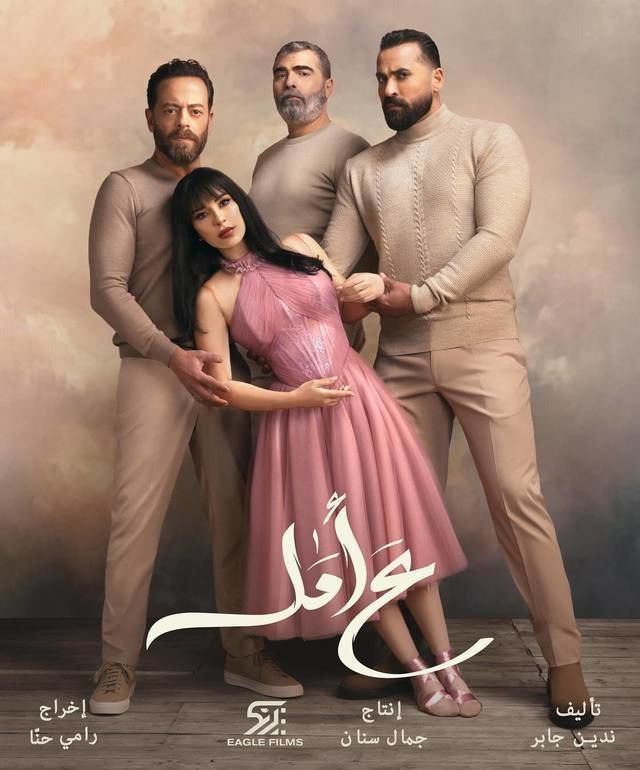“Aa Amal”: a feminist odyssey to encourage women to get emancipated
In the landscape of television soap operas broadcast during this Ramadan, Aa Amal (with hope) is distinguished by its captivating history and its exploration of social issues. Written by Nadine Jaber and directed by Rami Hanna, AA Amal transcends simple entertainment to become a fiery forum for women’s rights.
At the heart of this captivating saga lies the Helm family from Kfar Helm, a Lebanese family whose interior struggles reflect the tensions and injustices of a patriarchal society. Under the authoritarian Seif farm, magnificently embodied by Amar Shalak, family women are relegated to a status of subordination, subject to rigid rules, to oppressive traditions and even to violence.
The story takes on a poignant turn with the tragic fate of desad, personified by Maguy Bou Ghosn. Fleeing an abusive, desired marriage becomes the vibrant symbol of women’s struggle for freedom and dignity. His career, marked by an honor crime perpetrated by his own brother, highlights the challenges and sacrifices that women face in a society that struggles to recognize their value and their autonomy.
However, even at the heart of darkness, AA Amal offers a glow of hope through characters like Yassar, once desired. As an intrepid journalist and a courageous mother, Yassar openly challenges the oppressive standards of society, reminding spectators the power of individual resistance and the fight for justice.


The series also explores the complex dynamics between male characters, notably Nibal, embodied by Mehyar Khdour, and Jalal, played brilliantly by Badih Abou Chakra. Their interior struggles and their moral choices enrich the plot, offering nuanced perspectives on power and gender relationships.
But AA Amal Go beyond the simple family story to become a powerful declaration in favor of the emancipation of women. Through captivating intrigues and impactful dialogues, the series celebrates the collective force of women who unite to challenge oppressive social standards and claim their place in a fairer and egalitarian society.
Plunging into the different facets of societyAa Amal contrasts urban and rural lifestyles. In the lively alleys of the city, women find a certain freedom and can aspire to a progressive emancipation, while in the remote villages, the archaic traditions maintain women in a state of dependence and submission, close to slavery. This duality between urban modernity and rural tradition offers a striking contrast that highlights the challenges that women face in their quest for freedom and autonomy.
Another striking contrast lies in the difference between generations. Young men, even in the countryside, display an open -mindedness and tolerance that defy the rigid standards of their ancestors. Raised in an environment where obsolete traditions often dictate behavior, these young men arouse the hope of progressive change within their community.
AA Amal Also pushes women to break the channels of oppression and to claim their place in a fairer and egalitarian society. Initially discreetly, then increasingly direct over the episodes, the series conveys a powerful message: that of the revolt against archaic traditions and the fight for the freedom and the fundamental rights of women.
At the heart of this struggle are basic claims, such as the right to education, the right to work and the right to choose his spouse, as many fundamental freedoms as women are too often deprived in the regions where conservative traditions persist.
The soap opera AA Amal Awarded a major debate in Lebanon by highlighting questions of violence against women and honor crimes, thus encouraging activists and some officials to take significant measures against this form of violence.
Faced with the issues raised by the series and in a incomplete legislative context, the Lebanese association “Kafa”, in collaboration with several deputies, proposed a law aimed at fighting violence in all its forms against women.
This bill is based on the principles of international law of human rights and international humanitarian law. It particularly emphasizes several crucial points:
– Consider violence against women as a form of discrimination and a violation of human rights, and treat it as a crime punishable by law.
– Reject any cultural justification, customary or “honor” for acts of violence against women.
– Respect the will of women in the choices that concern them, guaranteeing their freedom of decision.
– Ensure the personal security and privacy of women, by providing them with adequate legal protection.
– provide legal support to women and girls victims of violence, allowing them to access justice and benefiting from the necessary judicial aid.
– Follow women and girls victims of violence, in collaboration with the competent authorities, in order to provide them with the social, health and psychological assistance necessary for their restoration and reinstatement as far as possible.
Actress Maguy Bou Ghosn, the main interpreter of the series, praised this initiative on the X platform, thus stressing the transformation of the soap opera into an effective means of societal change. She expressed her gratitude to the Lebanese MP Paula Yacoubian and the Kafa association for their hard work in favor of this cause.
The screenwriter Nadine Jaber also reacted with pride, highlighting the positive impact of television works in awareness and social influence. She thanked all those who contributed to this initiative, stressing the importance of protecting all women from violence.
In reality the Aa Amal soap opera is not content to entertain; He challenges, he questions and he inspires. Through his vibrating characters and captivating intrigues, he reminds us of the crucial importance of the struggle for gender equality and respect for fundamental rights. He asserts himself as a call for action to promote women’s rights, fight against retrograde and misogynist ideas, and eradicate honor crimes and any form of violence against women. By stimulating dialogue and encouraging action, this television series asserts itself as a headlight of hope in a world where the quest for freedom and dignity remains a tireless struggle.
You can see AA Amal On the Shahid platform, in the original Lebanese version, subtitled in several languages, including English and French.
Here is the teaser of the series, which illustrates violence against women well:
Neïla Driss









